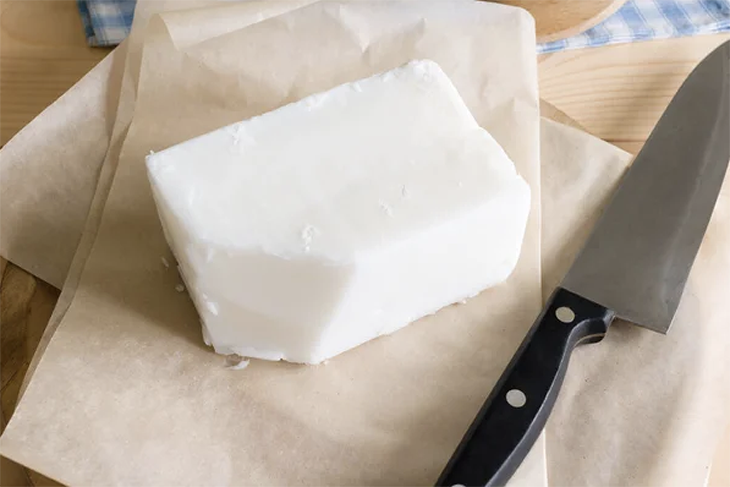
If you’re weary of investing time and money into an extensive skincare regimen, you might find the beef tallow trend on TikTok intriguing.
Beauty influencers are adamant that beef tallow, rendered beef fat devoid of moisture and solids, traditionally used in cooking and crafting soaps and candles, offers a natural, affordable, and age-old solution to common skin issues such as acne, dryness, and scarring.
The hashtag #beeftallow boasts over 3K posts, while #beeftallowskinscare has amassed over 1.3K on the platform.
“About a year ago, I realized it literally makes zero sense to have such a complicated skin-care routine, because our skin puts all this effort into producing its own natural oils and its own sebum, yet every night before going to bed we’re stripping it off with all these harsh products,” @thrivewithcandice (23K followers) said in a January 9 video that received 7.3M views.
One advocate explains her routine: she has abandoned cleansers in favor of dry brushing, followed by a warm water rinse and application of beef tallow serum for hydration. “That’s literally it,” she emphasizes. She attributes her transformed skin – formerly prone to redness and acne – to this method, coupled with proper nutrition, sleep, exercise, and sunlight.
However, most dermatologists advise against replacing your moisturizer with animal fat, as there is limited scientific evidence supporting its efficacy as a skincare remedy.
“Getting these oils from an animal source like beef wouldn’t be my first choice, given concerns regarding contamination, smell, and not being safe for vegan consumers,” says board certified dermatologist in San Francisco, Caren Campbell, MD.
“While novelty is all the rage for clicks and likes and follows, ingredients with a long track record of safety are best,” she adds.
“I’m not a fan of DIY skin care, nor do I think using ‘natural’ ingredients is better,” Jenny Liu, MD, a board certified dermatologist in Minneapolis, says.
Before you follow all these social media trends and try it for yourself, experts want you to know other information about this popular trend.
What Are the Supposed Benefits of Beef Tallow for Skin?
Many TikTokers are praising the nutritional composition of beef tallow, often sourced from the cooking aisle rather than the beauty section of their local health food store.
According to @santacruzmedicinals (510K followers), the waxy substance is “extremely rich in retinol, which is vitamin A, and it closely mimics our body’s natural oil. After I shower, I take a small amount of this and I rub it all over my face.”
As for @maggieroseadvocate (343.7K followers), she praises the balm for being rich in vitamins E, A, D, K, and omega-3 and omega-6 fatty acids. “There’s a reason our ancestors did this!” she says.
An associate professor of dermatology at Mount Sinai Hospital in New York City, Joshua Zeichner, MD, shares that they’re not entirely wrong.
“There’s little harm to applying beef tallow to the skin, although there certainly are more cosmetically elegant, well-formulated moisturizers to get the job done,” he says. He also adds that the substance does indeed contain the same types of fats found naturally in the skin’s outer layer.
“By applying it to the skin, it provides emollient benefits to soften rough cells on the skin‘s surface [as well as] hydration benefits,” Dr. Zeichner says.
Registered pharmacist, nutritionist, and skin-care chemist in Boulder, Colorado, Benjamin Knight Fuchs, says that beef tallow – which is mostly made of saturated fat – can provide some benefits due to its fatty vitamins and cholesterol.
Take, for instance, vitamin A, also known as retinol, which plays a crucial role in maintaining skin health. Synthetic variations are recognized for their ability to combat acne, psoriasis, warts, premature aging, and even fine lines and wrinkles.
Research highlights that omega-3 and omega-6 fatty acids possess anti-inflammatory properties.
However, the mere presence of skin-beneficial vitamins in a product doesn’t guarantee safe absorption or superiority over well-researched and regulated alternatives.
Fuch says, “As far as cellular activity and overall skin health benefits go, there’s very little reason to recommend [beef tallow].”
Retinol vs. Beef Tallow
The belief that beef tallow can compete with retinol is flawed. While beef tallow my offer moisturizing benefits, retinol operates by penetrating beneath the skin’s surface to neutralize harmful free radicals – molecules that jeopardize vital bodily functions by attacking beneficial molecules.
“They are not an apples for apples swap,” Dr. Campbell says.
“No one who understands the chemistry of ingredients or the biology of the skin would ever say tallow is even remotely as effective or functional a skin-care ingredient as retinol,” Fuchs adds.
Moreover, the notion that beef tallow is safe and beneficial for skin application solely because it’s “natural” and has historical usage doesn’t withstand scrutiny. According to Campbell, other plant-based oils such as olive, coconut, and sunflower oil, commonly found in skincare products, also possess similar properties.
Fuchs puts it more bluntly, saying, “Cow manure is also natural.” Just in the same way that toxic substances like mercury, lead, and arsenic “have been used throughout history, but that does not mean that they’re effective, healthy, or beneficial skin-care ingredients,” he explains.
Possible Risks of Beef Tallow for Skin Care
Aside from beef tallow falling short of all of these TikTokers’ claims, it may also pose other risks for beauty enthusiasts. One examples is that since it is not a regulated product for skin-care by the U.S. Food and Drug Administration (FDA), it could even be contaminated or pose possible allergy risks to users, says Dr. Campbell.
In addition, Dr. Liu says, “oils in general are just occlusives, but not as good as a petrolatum at reducing water loss, and may cause other skin issues like irritation or reaction.”
If you’re considering trying beef tallow, it’s advisable to choose a beef-tallow-infused balm specifically designed for skincare rather than simply grabbing a jar from the grocery store. Using straight tallow form the store can pose a significant risk of pore-clogging, particularly unsuitable for acne treatment due to its high oleic acid content, as highlighted by Dr. Zeichner, who suggests benzoyl peroxide as an alternative.
For beef tallow skincare products, Dr. Campbell recommends seeking out those labeled as “non-comedogenic,” indicating they’ve been tested to avoid pore blockage, although this assertion lacks FDA regulation.
Ultimately, Dr. Campbell highlights the limited research supporting tallow’s superiority over other oil sources for skincare. While a study demonstrated potential benefits of various oils, including beef tallow, in treating eczema, it didn’t specify which oil or combination provided the benefit. Moreover, this study was conducted on mice, further emphasizing the need for more comprehensive research.
Dr. Campbell adds that it will be truly impossible to know if beef tallow is a helpful skin care ingredient “until studies on only tallow are pursued.”



